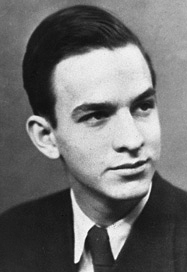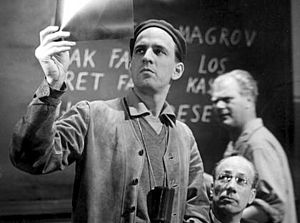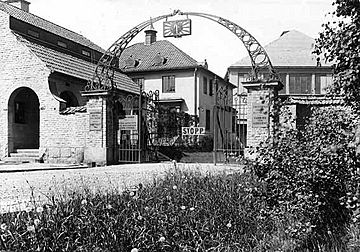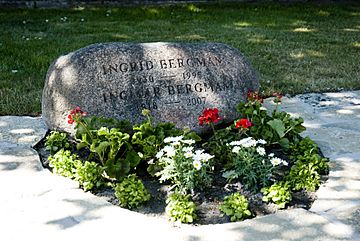Ingmar Bergman facts for kids
Quick facts for kids
Ingmar Bergman
|
|
|---|---|
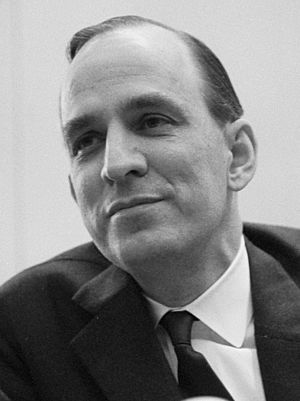
Bergman in 1966
|
|
| Born |
Ernst Ingmar Bergman
14 July 1918 Uppsala, Sweden
|
| Died | 30 July 2007 (aged 89) Fårö, Sweden
|
| Other names | Buntel Eriksson |
| Alma mater | Stockholm University |
| Occupation |
|
| Years active | 1944–2005 |
| Spouse(s) |
|
| Children | 9, including:
|
| Awards |
|
| Signature | |
 |
|
Ernst Ingmar Bergman (born July 14, 1918 – died July 30, 2007) was a famous Swedish filmmaker. Many people think he was one of the greatest and most important filmmakers ever. His movies are known for exploring deep thoughts about people's minds and feelings.
Bergman directed over 60 films and TV shows, and he wrote most of them too. Many of his films were set in Sweden, especially on the island of Fårö. He also had a big career in theatre, directing more than 170 plays. He worked closely with his camera experts, Gunnar Fischer and Sven Nykvist. He also often worked with a group of talented actors like Harriet Andersson, Bibi Andersson, Liv Ullmann, and Max von Sydow.
Film critic Philip French called Bergman "one of the greatest artists of the 20th century." Director Martin Scorsese said Bergman's films had a huge impact on people. In 2002, a poll by Sight & Sound magazine ranked Bergman as the 8th greatest director of all time.
Contents
Biography
Early Life and Education
Ingmar Bergman was born on July 14, 1918, in Uppsala, Sweden. His father, Erik Bergman, was a Lutheran minister. His mother, Karin, was a nurse. Ingmar grew up with his older brother, Dag, and younger sister, Margareta. Their home was very religious, and his father had strict rules for raising children.
Even though he grew up in a religious home, Bergman later said he stopped believing in God when he was eight. He came to terms with this while making his 1962 film, Winter Light. His love for theatre and film started very early. When he was nine, he traded toy soldiers for a magic lantern. This toy changed his life. He used it to create his own little world, making scenery, puppets, and lighting effects. He even put on puppet shows of plays by August Strindberg, speaking all the parts himself.
As a teenager, Bergman went to the Palmgren School. He didn't enjoy his school years and later remembered them as unhappy. He once wrote that he really disliked how much schools focused on homework and tests.
In 1934, when he was 16, Bergman visited Germany for the summer. He went to a big political rally where he saw Adolf Hitler. In his book, Laterna Magica, Bergman wrote that for many years, he supported Hitler and was happy when he succeeded. He found the Nazi movement "fun and youthful" at the time. However, after seeing the horrors of the concentration camps, he realized he had been wrong. He said he "was suddenly ripped of my innocence."
In 1937, Bergman started studying art and literature at Stockholm University. He spent most of his time involved in student theatre and became a big fan of movies. He also had a difficult relationship with his father during this time, which caused a long break between them. Even though he didn't finish university, he wrote many plays and an opera. He became an assistant director at a local theatre. In 1942, he got to direct one of his own plays, Caspar's Death. People from Svensk Filmindustri saw the play and offered Bergman a job writing film scripts. He married Else Fisher in 1943.
Early Film Career (until 1975)
Bergman's film career officially began in 1941 when he started rewriting scripts. His first big success came in 1944 when he wrote the screenplay for Torment. He also worked as an assistant director on this film. Bergman later said that filming the outdoor scenes for Torment felt like his real start as a film director. The movie led to discussions about Swedish schools. Bergman wrote that he "hated school as a principle, as a system and as an institution." The international success of Torment gave Bergman his first chance to direct his own film a year later. Over the next ten years, he wrote and directed more than a dozen films, including Prison (1949), Sawdust and Tinsel (1953), and Summer with Monika (1953).
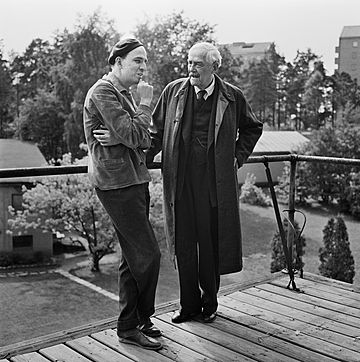
Bergman became famous worldwide with Smiles of a Summer Night (1955). This film won an award at the Cannes Film Festival. After that, he made two very famous films in 1957: The Seventh Seal and Wild Strawberries. The Seventh Seal won a special jury prize at Cannes, and Wild Strawberries won many awards for Bergman and its star, Victor Sjöström. Bergman continued to make many films for the next twenty years. From the early 1960s, he lived on the island of Fårö, where he filmed several of his movies.
In the early 1960s, he directed three films that explored ideas about faith and doubt: Through a Glass Darkly (1961), Winter Light (1962), and The Silence (1963). Critics often called these films a "trilogy" because of their similar themes. Bergman first said he didn't plan them as a trilogy, but he later seemed to agree. His film All These Women (1964) was a funny take on the films of another famous director, Federico Fellini.
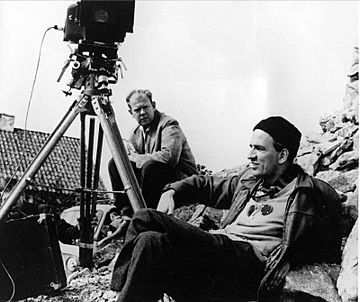
Persona (1966), starring Bibi Andersson and Liv Ullmann, was a very experimental film that Bergman considered one of his most important works. Other films from this time include The Virgin Spring (1960), Hour of the Wolf (1968), Shame (1968), and The Passion of Anna (1969). For Cries and Whispers (1972), Bergman and his cinematographer Sven Nykvist used a lot of red color. This film was nominated for an Academy Award for Best Picture. Bergman also made many TV shows for Swedish television, like Scenes from a Marriage (1973) and The Magic Flute (1975).
Later Career and Retirement
After some difficulties in Sweden, Bergman moved to Munich, Germany, in 1977. His next film, The Serpent's Egg (1977), was a German-American production. This was followed by Autumn Sonata (1978), starring Ingrid Bergman (no relation), and From the Life of the Marionettes (1980).
He returned to Sweden to direct Fanny and Alexander (1982). Bergman said this would be his last film, and that he would then focus on theatre. After Fanny and Alexander, he wrote several film scripts and directed many TV specials. Some of these TV shows were later shown in movie theatres. His last film was Saraband (2003), a follow-up to Scenes from a Marriage, which he directed when he was 84 years old.
Even though he worked from Munich for a while, Bergman slowly became less upset with the Swedish government. In 1978, he visited Sweden and celebrated his 60th birthday on the island of Fårö. He also started directing plays again at the Royal Dramatic Theatre. To celebrate his return, the Swedish Film Institute created the Ingmar Bergman Award. He stayed in Munich until 1984. In a 2005 interview, Bergman said that even though he was busy during his time away, he felt like he lost eight years of his professional life.
Retirement and Death
Bergman stopped making films in December 2003. He had hip surgery in October 2006 and was recovering slowly. He passed away peacefully in his sleep at his home on the island of Fårö on July 30, 2007, just sixteen days after his 89th birthday. He was buried privately at the Fårö Church on August 18, 2007.
Filmography
Working Style
Working with Actors and Crew
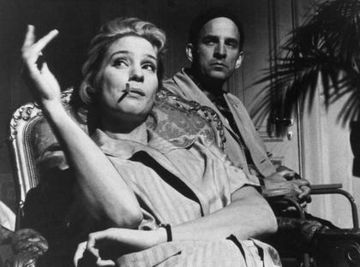
Bergman had a special group of Swedish actors he often used in his films. These included Max von Sydow, Bibi Andersson, Harriet Andersson, Erland Josephson, Ingrid Thulin, Gunnel Lindblom, and Gunnar Björnstrand. Each of them appeared in at least five of his movies. Norwegian actress Liv Ullmann, who was in nine of his films, became very close to Bergman both professionally and personally. They had a daughter together, Linn Ullmann.
Bergman had a great working relationship with his main camera expert, Sven Nykvist. They understood each other so well that Bergman didn't need to worry about how a shot looked until the day before filming. On the morning of the shoot, he would briefly tell Nykvist the mood and look he wanted, then let Nykvist work without interruption.
Filming Locations and Budget
Bergman said he never had trouble getting money for his films. He gave two reasons for this. First, he didn't live in the United States, where he felt people cared too much about how much money a movie made. Second, his films usually didn't cost a lot to make. For example, Cries and Whispers cost about $450,000, and Scenes from a Marriage (a six-episode TV show) cost only $200,000. Many of his indoor scenes were filmed at the Filmstaden studios near Stockholm.
Filming Techniques
Bergman usually wrote his own screenplays. He would think about them for months or even years before he started writing, which he found a bit boring. His earlier films were very carefully planned. As his career went on, Bergman let his actors improvise their lines more and more. In his later films, he would just write down the main ideas for a scene and let the actors decide the exact words.
Common Themes
Bergman's films often explore big questions about life, death, loneliness, and religious belief. These are called existential questions.
Bergman's Thoughts on His Work
In interviews from 2004, Bergman said that he thought Winter Light, Persona, and Cries and Whispers were his most important works. He felt he pushed the boundaries of filmmaking with Persona and Cries and Whispers. Bergman also said that The Silence marked the end of a time when religious questions were a main focus of his films. He admitted that his own films sometimes made him feel sad and "miserable." He also said that if there was one thing he missed about making films, it was working with his cinematographer, Sven Nykvist.
Theatre Work
Even though Bergman was famous for his films, he was also a very active and busy theatre director throughout his life. He started in student theatre at Stockholm University. After graduating, he became a trainee director in Stockholm. When he was 26, he became the youngest theatre manager in Europe at the Helsingborg City Theatre. He then directed at the Gothenburg city theatre from 1946 to 1949.
In 1953, he became the director of the Malmö City Theatre and stayed for seven years. Many of the actors he worked with in films first started with him on stage. He was the director of the Royal Dramatic Theatre in Stockholm from 1960 to 1966.
After he left Sweden for a time, he became the director of the Residenz Theatre in Munich, Germany (1977–1984). He continued to work in theatre through the 1990s. His last stage production was Henrik Ibsen's Ghosts in 2003.
Personal Life
Family and Relationships
Bergman was married five times:
- 1943–1945, to Else Fisher, a choreographer and dancer. They had one child, Lena.
- 1945–1950, to Ellen Lundström, a choreographer and film director. They had four children: Eva, Jan, and twins Mats and Anna.
- 1951–1959, to Gun Grut, a journalist. They had one child, Ingmar Jr.
- 1959–1969, to Käbi Laretei, a concert pianist. They had one child, Daniel.
- 1971–1995, to Ingrid von Rosen. They had one child, Maria.
His first four marriages ended in divorce. His last marriage ended when his wife Ingrid passed away in 1995. Besides his marriages, Bergman also had relationships with actresses Harriet Andersson, Bibi Andersson, and Liv Ullmann. He had a daughter, Linn Ullmann, with Liv Ullmann. In total, Bergman had nine children. He married all the mothers of his children except for Liv Ullmann.
Even though Bergman once said he didn't believe in an afterlife, in 2000 he mentioned that a conversation with his friend Erland Josephson helped him believe he would see Ingrid again. He said, "I'm not actually afraid of dying. On the contrary, really. I think it'll be interesting."
Health
Bergman had health problems like insomnia (trouble sleeping) and severe stomach issues since he was a child. He often joked that the private bathrooms he made sure to have at the theatres where he worked were his "most lasting contribution to the history of theatre."
Awards and Recognition
In 1958, Bergman won the Best Director award for Brink of Life at the Cannes Film Festival. He also won the Golden Bear for Wild Strawberries at the Berlin Film Festival. In 1960, he was featured on the cover of TIME magazine.
In 1971, Bergman received the Irving G. Thalberg Memorial Award at the Academy Awards. Three of his films – Through a Glass Darkly, The Virgin Spring, and Fanny and Alexander – won the Academy Award for Best Foreign Language Film. In 1997, he received the Palme des Palmes (Palm of the Palms) at the 50th anniversary of the Cannes Film Festival. He won many other awards and was nominated for many more.
Academy Awards
| Year | Category | Nominated work | Result |
|---|---|---|---|
| 1959 | Best Original Screenplay | Wild Strawberries | Nominated |
| 1960 | Best Foreign Language Film | The Virgin Spring | Won |
| 1961 | Through a Glass Darkly | Won | |
| 1962 | Best Original Screenplay | Nominated | |
| 1973 | Best Picture | Cries and Whispers | Nominated |
| Best Director | Nominated | ||
| Best Original Screenplay | Nominated | ||
| 1976 | Best Director | Face to Face | Nominated |
| 1978 | Best Original Screenplay | Autumn Sonata | Nominated |
| 1983 | Best Foreign Language Film | Fanny and Alexander | Won |
| Best Director | Nominated | ||
| Best Original Screenplay | Nominated |
Legacy and Influence
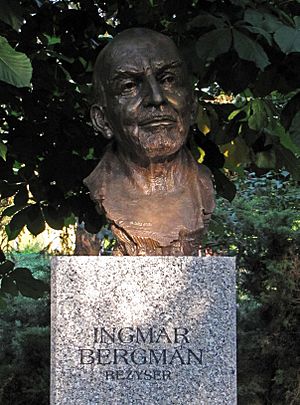
Many magazines and groups have ranked Bergman as one of the greatest directors. In 1996, Entertainment Weekly put him at number 8 on their "50 Greatest Directors" list. In 2002, the British Film Institute's Sight & Sound list placed him at number 9. MovieMaker magazine ranked him 13th on their 2002 list of "The 25 Most Influential Directors of All Time."
Famous director Stanley Kubrick greatly admired Bergman's work. He wrote in a letter that Bergman's films moved him deeply. Kubrick believed Bergman was the greatest filmmaker working at the time.
Bergman's films also inspired director Woody Allen. Allen called Bergman "probably the greatest film artist" since cameras were invented. Bergman's films are mentioned and praised in Allen's movies, like Annie Hall. Allen also admired Bergman's camera expert, Sven Nykvist, and asked him to work on his film Crimes and Misdemeanors.
Danish Director Thomas Vinterberg said Bergman was one of his biggest influences. He said, "Bergman is always in my head." Writer and director Richard Ayoade also considers Bergman an inspiration.
After Bergman passed away, a large collection of his notes was given to the Swedish Film Institute. This collection includes many plays and film scripts that were never finished or published. A play called Kärlek utan älskare ("Love without lovers") was found with a note saying "Complete disaster!" This play was about a director who disappears. A Swedish director named Marcus Lindeen used parts of Bergman's unfinished works to create a new play called Arkivet för orealiserbara drömmar och visioner ("The archive for unrealisable dreams and visions"). This play opened in 2012.
In 2018, for Bergman's 100th birthday, The Criterion Collection released a special Blu-ray set with 39 of his films. This set covers his career from the 1940s to his last film in 2003. The films are grouped like a film festival and come with a book of essays about each movie.
The Ingmar Bergman International Debut Award is given out every year at the Gothenburg Film Festival. This award helps new filmmakers and includes a visit to Bergman's home and personal archives.
See also
 In Spanish: Ingmar Bergman para niños
In Spanish: Ingmar Bergman para niños
- Cinema of Sweden
- List of film collaborations
 | Audre Lorde |
 | John Berry Meachum |
 | Ferdinand Lee Barnett |


